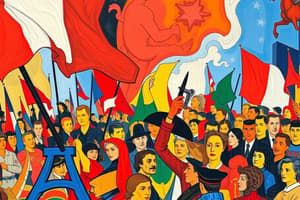Podcast
Questions and Answers
What event is considered the symbolic start of the French Revolution?
What event is considered the symbolic start of the French Revolution?
- Estates-General
- Women's March on Versailles
- Storming of the Bastille (correct)
- Tennis Court Oath
Which document asserted the principles of liberty, equality, and fraternity during the French Revolution?
Which document asserted the principles of liberty, equality, and fraternity during the French Revolution?
- Declaration of the Rights of Man and of the Citizen (correct)
- Constitution of 1791
- Tennis Court Oath
- Napoleonic Code
What phase of the French Revolution was marked by the Reign of Terror?
What phase of the French Revolution was marked by the Reign of Terror?
- Radical Phase (correct)
- Thermidorian Reaction
- National Assembly
- Directory
Which of the following events involved women demanding the king's return to Paris?
Which of the following events involved women demanding the king's return to Paris?
Which key figure was executed during the Reign of Terror?
Which key figure was executed during the Reign of Terror?
Flashcards are hidden until you start studying
Study Notes
French Revolution
-
Time Period: 1789 - 1799
-
Causes:
- Social inequality (Three Estates: clergy, nobility, commoners)
- Economic hardship (debt, famine, taxation)
- Enlightenment ideas (liberty, equality, fraternity)
- Weak leadership (King Louis XVI)
-
Key Events:
- Estates-General (May 1789): Assembly of representatives from all three estates.
- Tennis Court Oath (June 1789): Third Estate vows to draft a new constitution.
- Storming of the Bastille (July 14, 1789): Symbolic start of the revolution.
- Declaration of the Rights of Man and of the Citizen (August 1789): Fundamental document asserting individual rights.
- Women's March on Versailles (October 1789): Women demand bread and the king's return to Paris.
-
Major Phases:
- National Assembly (1789-1791): Formation of a constitutional monarchy.
- Radical Phase (1792-1794): Rise of the Jacobins, Reign of Terror led by Robespierre, execution of Louis XVI.
- Thermidorian Reaction (1794): Fall of Robespierre and end of the Reign of Terror.
- Directory (1795-1799): A five-man government structure, instability and corruption.
-
Key Figures:
- Maximilien Robespierre: Leader during the Reign of Terror.
- Louis XVI: King of France, executed in 1793.
- Marie Antoinette: Queen of France, executed in 1793.
- Georges Danton: Early leader of the revolution, later executed.
-
Impact:
- End of absolute monarchy in France.
- Rise of secularism and nationalism.
- Spread of revolutionary ideas across Europe.
- Influence on future revolutions (e.g., Haitian Revolution, Latin American wars of independence).
-
Aftermath:
- Rise of Napoleon Bonaparte and establishment of the Consulate in 1799.
- Shift in political power dynamics in Europe.
- Creation of modern concepts of citizenship and rights.
Overview of the French Revolution
- Occurred between 1789 and 1799, marking a significant shift in French history.
- Rooted in social, economic, and political grievances of the time.
Causes of the Revolution
- Social Inequality: The French society was divided into three estates: clergy (First Estate), nobility (Second Estate), and commoners (Third Estate), with the latter facing the greatest burdens.
- Economic Hardship: Significant national debt, widespread famine, and heavy taxation influenced public discontent.
- Enlightenment Ideas: The spread of ideas centered around liberty, equality, and fraternity inspired revolutionary thoughts.
- Weak Leadership: King Louis XVI’s indecisiveness and ineffective governance contributed to the crisis.
Key Events
- Estates-General (May 1789): Gathering of representatives from all three estates to address financial issues.
- Tennis Court Oath (June 1789): Members of the Third Estate pledge to create a new constitution, initiating a demand for political reform.
- Storming of the Bastille (July 14, 1789): Attack on the Bastille prison symbolizes the revolution’s outbreak and opposition to royal authority.
- Declaration of the Rights of Man and of the Citizen (August 1789): Essential document declaring individual rights and principles of democracy.
- Women's March on Versailles (October 1789): Demonstration by women seeking bread and bringing the king back to Paris, highlighting public unrest.
Major Phases
- National Assembly (1789-1791): Transition towards a constitutional monarchy, representing the interests of the Third Estate.
- Radical Phase (1792-1794): Dominated by the Jacobins and marked by the Reign of Terror under Robespierre; key events included grand executions, including that of Louis XVI.
- Thermidorian Reaction (1794): Resulting in the fall of Robespierre and a curtailing of radical policies following the Reign of Terror.
- Directory (1795-1799): Established a five-man government amidst growing instability and corruption.
Key Figures
- Maximilien Robespierre: Influential leader during the Reign of Terror advocating for radical changes and implementing mass executions.
- Louis XVI: The reigning king at the revolution’s onset, ultimately executed for treason.
- Marie Antoinette: Queen of France, associated with opulence and executed in 1793.
- Georges Danton: Early revolutionary leader who initially supported the movement but later faced execution.
Impact of the Revolution
- Abolished absolute monarchy, laying the groundwork for modern democratic governance in France.
- Promoted secularism and nationalism, changing societal values fundamentally.
- Inspired revolutionary movements across Europe, including the Haitian Revolution and independence struggles in Latin America.
Aftermath
- Rise of Napoleon Bonaparte, leading to the establishment of the Consulate in 1799.
- Shift in European political dynamics, influencing future governance and societal development.
- Introduction of modern concepts surrounding citizenship and rights, setting the stage for future democratic principles.
Studying That Suits You
Use AI to generate personalized quizzes and flashcards to suit your learning preferences.




